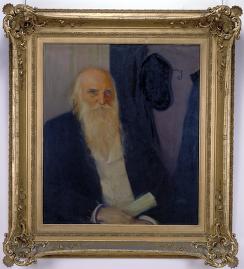
George Sheldon
(1818-1916)
George Sheldon was a Deerfield, Massachusetts, farmer and highly regarded town historian. He was born in Deerfield and educated at Deerfield Academy. In 1844 he married Susan Stewart of Dummerston, Vermont, and from 1853 to 1857 he lived in Chicopee, Massachusetts. In 1857 he was appointed Justice of the Peace at Deerfield and in 1867 was elected as a representative to the Massachusetts General Court, the state legislature. He was elected state senator in 1872. Sheldon's interest in history and historical preservation began in 1848 in response to the demolition of Deerfield's Old Indian House. This legendary building had survived the 1704 raid on the town by French and Native allies during Queen Anne's War (1701-1713), and was the first home occupied by the Sheldon family in Deerfield. Sheldon, along with others, was able to preserve only the house's front door and some architectural fragments. In 1868 he and others erected a monument to honor the town's Civil War soldiers. Two years later they decided to mark the spot near the Green River in present-day Greenfield, Massachusetts, where Eunice (Mather) Williams (1664-1704), wife of Reverend John Williams (1664-1729), was killed during the march to Canada after the 1704 raid. From that, the Pocumtuck Valley Memorial Association (PVMA) was born, taking the name "Pocumtuck" from the people (and their village) who inhabited the land that later became Deerfield. PVMA was one of the first historic preservation societies in the country. Sheldon was named PVMA's president, a post he held to his death. Although he split his time between Deerfield and Boston, George Sheldon remained an important voice in town issues and a dynamic leader of PVMA. In 1896 he published the "History of Deerfield," a comprehensive, two-volume history that included an extensive genealogy of town residents. His wife Susan died in 1881, and in 1897 he married Jennie Maria Arms. George Sheldon lived to be ninety-eight years old.